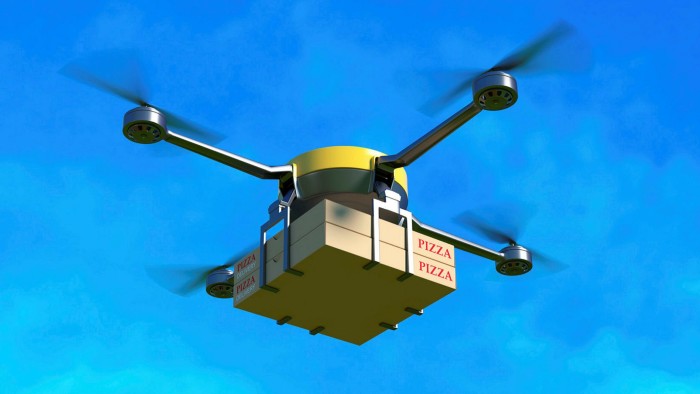Drone deliveries to rural areas on UK government’s radar

Roula Khalaf, Editor of the FT, selects her favourite stories in this weekly newsletter.
The UK government is considering allowing drones to deliver goods to rural areas as part of a plan to ensure remote parts of the country are not left behind by advances in transport technology.
Ministers are asking for feedback on a number of ideas, including using drones to cut delivery times “in rural or isolated towns” and reduce carbon emissions.
Other plans include using electric aircraft to fly passengers short distances, introducing electric cargo bikes into rural transport systems, linking different transport services into a single app, and making walking and cycling maps available online.
Large drones were used to transport medical supplies to the Isle of Wight earlier this year during the first months of the coronavirus pandemic, while the government wants to explore the potential for delivery companies to use them in other parts of the country.
The plans are at a very early stage and any rollout will have to be subject to negotiation with regulators such as the Civil Aviation Authority and, in some areas, the military.
Rachel Maclean, transport minister, will unveil the plans at the Financial Times’s Future of Mobility summit on Tuesday, saying they “will give us a unique opportunity to harness the community spirit of rural areas to understand how innovation in transport can benefit the people and communities that need it most”.
“Now more than ever, it is important that we use the power of transport to build back greener and transform how people and goods move around the UK.”
The virtual conference, also featuring European Transport Commissioner Adina Valean, as well as the chief executives of Heathrow airport, the HS2 railway and the National Infrastructure Commission, brings together executives across the industry at a time when the pandemic has led to dramatic changes in travel patterns, with airlines and rail companies seeing sharp declines in passenger numbers.
Other ideas floated in the UK government’s “call for evidence” include using digital maps to give easier access to walking and cycling routes outside cities, in an effort to boost exercise.
It will also ask businesses and consumers to advise whether so-called micro-mobility services, such as cargo bikes or electric scooters, would be able to operate outside of dense city centres.
While electric scooters are currently banned in the UK, there are several trials of scooter hire schemes in England, including in Milton Keynes and Essex.
Such schemes, which have been popular in the US for several years, tend to work in large urban areas where operators can make a profit from multiple journeys a day.
But the government wants to find out whether the model could work in rural areas as well, in order to cut emissions and unnecessary car journeys.
Felix Petersen, from Ford-owned scooter business Spin, will tell Tuesday’s FT summit that about two-thirds of its scooter journeys replace car trips, with around a third of its users travelling to and from train or bus stations.
The business will announce on Tuesday that it is setting up a £100,000 fund to finance studies into how people use different types of transport.
The company will fund research from 10 universities to help it understand usage patterns, and increase safety of its riders.
The US company launched scooter services in Germany and some trial services in the UK earlier this year.
Comments